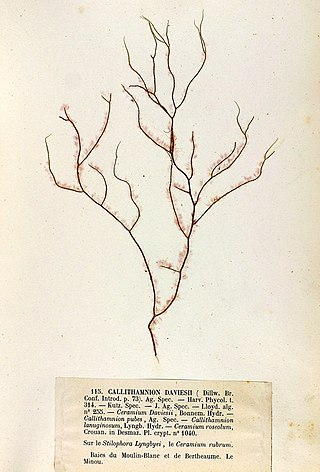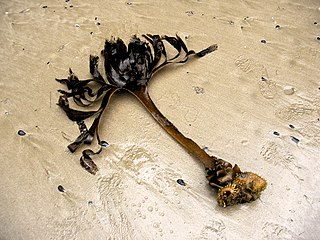
Gracilaria is a genus of red algae (Rhodophyta) notable for its economic importance as an agarophyte, as well as its use as a food for humans and various species of shellfish. Various species in the genus are cultivated among Asia, South America, Africa and Oceania.

Chordariaceae is a family of brown algae. Members of this family are may be filamentous, crustose with fused cells at the base, or they may be terete and differentiated into a central medulla and an outer photosynthetic cortex. They have a sporphytic thallus usually aggregated to form a pseudo-parenchyma.

Ectocarpales is a very large order in the brown algae. The order includes families with pseudoparenchymatous (Splachnidiaceae) or true parenchymatous (Scytosiphonaceae) tissue. Pseudoparenchymatous refers to a filamentous alga with cells packed very close together to give an appearance of parenchymatous tissue, the latter being composed of cells which can truly divide in three dimensions, unusual among the algae. Filamentous algae are composed of cells that divide along a single plane, allowing only elongation to form filaments of one or more rows of cells. Algae that can divide in two planes can form sheet-like thalli or bodies. Cells that can divide in a third plane potentially allow for the organism to develop a more complex body plan, and diversification of body plans into an erect thallus of some sort and a holdfast for attaching the upright portion to the substrate.

Colpomenia is a genus of brown macroalgae in the family Scytosiphonaceae.

Halymenia a genus of a macroscopic red algae that grows in oceans worldwide.
Bangia is an extant genus of division Rhodophyta that grows in marine or freshwater habitats. Bangia has small thalli with rapid growth and high reproductive output, and exhibits behavior characteristic of r-selected species. The plants are attached by down-growing rhizoids, usually in dense purple-black to rust-colored clumps. The chloroplasts of Bangia, like others in the division Rhodophyta, contain chlorophyll a and sometimes chlorophyll d, as well as accessory pigments such as phycobilin pigments and xanthophylls. Depending on the relative proportions of these pigments and the light conditions, the overall color of the plant can range from green to red to purple to grey; however, the red pigment, phycoerythrin, is usually dominant.

Rhodymenia is a genus of red algae, containing the following species:

Hydroclathrus is a genus of perforate brown alga, of the phylum Ochrophyta and the class Phaeophyceae.

Laurencia is a genus of red algae that grow in temperate and tropical shore areas, in littoral to sublittoral habitats, at depths up to 65 m (213 ft).
Tribonema is a genus of filamentous, freshwater yellow-green algae. The holotype for the genus is the species Tribonema bombycina (C.Agardh) Derbès & Solier.

Colaconema is a genus of marine red algae. It is the only genus in the family ColaconemataceaeJ.T.Harper & G.W.Saunders which is the only family in Order ColaconematalesJ.T.Harper & G.W.Saunders.

Phyllariaceae is a family of brown algae in the order Tilopteridales.

Champia is a genus of red algae in the family Champiaceae, first described in 1809 by Nicaise Auguste Desvaux
Rosenvingea is a genus of brown algae first described by Børgesen in 1914.











